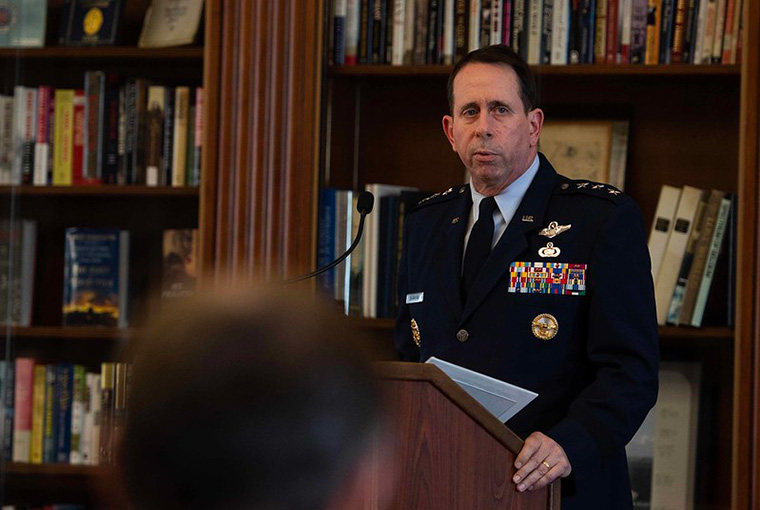Joint Artificial Intelligence Center Director Tells Naval War College Audience to ‘Dive In’ on AI

Saying the most important thing to do is just dive in, Lt. Gen. Jack Shanahan, director of the Department of Defense Joint Artificial Intelligence Center, talked to U.S. Naval War College students and faculty on Dec. 12 about the challenges and opportunities of fielding artificial intelligence technology in the U.S. military.
“On one side of the emerging tech equation, we need far more national security professionals who understand what this technology can do or, equally important, what it cannot do,” Shanahan told his audience in the college’s Mahan Reading Room.
“On the other side of the equation, we desperately need more people who grasp the societal implications of new technology, who are capable of looking at this new data-driven world through geopolitical, international relations, humanitarian and even philosophical lenses,” he said.
At the Joint AI Center, established in 2018 at the Pentagon, Shanahan is responsible for accelerating the Defense Department’s adoption and integration of AI in order to quickly affect national security operations at the largest possible scale.
He told the Naval War College audience that the most valuable contribution of AI to U.S. defense will be how it helps human beings to make better, faster and more precise decisions, especially during high-consequence operations.
“AI is like electricity or computers. Like electricity, AI is a transformative, general-purpose enabling technology capable of being used for good or for evil – but not a thing unto itself. It is not a weapons system, a gadget or a widget,” said the Air Force general whose prior position was director of Project Maven, a Defense Department program using machine learning to autonomously extract objects of interest from photos or video.
“If I have learned anything over the past three years, it’s that there’s a chasm between thinking, writing and talking about AI, and doing it,” Shanahan said.
“There is no substitute whatsoever for rolling up one’s sleeves and diving in an AI project,” he said.
Shanahan said adapting the Department of Defense to the AI world will be a multigenerational journey, requiring both urgency and patience.
He compared this moment in history to the period between World War I and World War II, when new ideas led to an explosion not just in military innovation but in technology advancement that eventually helped create Silicon Valley.
Now, the private sector is leading the way on AI, which leaves the Defense Department playing catch-up, Shanahan said. However, he added that he sees the U.S. military’s efforts running at a tempo comparable to commercial industry in five years from now.
China, he said, sees AI as a way to leapfrog over the current U.S. defense advantages.
“The Chinese military has identified intelligent-ization as a military revolution on par with mechanization from the internal combustion engine,” Shanahan said. “They are sprinting to incorporate AI technology in all aspects of their military, and the Chinese commercial industry is more than willing to help.”
After the speech, in an interview, Shanahan said AI isn’t an arms race, but it is a strategic competition.
“Regardless of what China does or does not do in AI, we have to accelerate our adoption of it. It’s that important to our future,” he said.
For example, Shanahan said, in 15 years, what if China has a fully AI-enabled military force, and the United States does not.
“To me that scenario brings us an unacceptably high risk of failure – because of the speed of the fight in the future, which we have not been prepared for as a result of fighting in the Middle East for 20-some years,” he said. “That, to me, is the best stark example of why we have to move in this direction.”
Looking at the importance of military higher education in the effort, Shanahan said the role of institutions such as the Naval War College is to make a place for the military’s rising stars to think about new ways to harness AI.
“What you are here to do is think strategy, the strategic and societal implications of using emerging and disruptive technology,” he said.
“You will find somebody comes out of here that has a spark, a lightbulb moment, that wants to go back and try this idea they developed while they were here,” said Shanahan, who is a 1996 graduate of the Naval War College’s College of Naval Command and Staff.
The Joint AI Center director said another role for military higher-education institutions is research on practical applications of AI.
“It’s the thinking about grand strategy and technology together that may be as important to the future of operating concepts as anything else,” he said.
